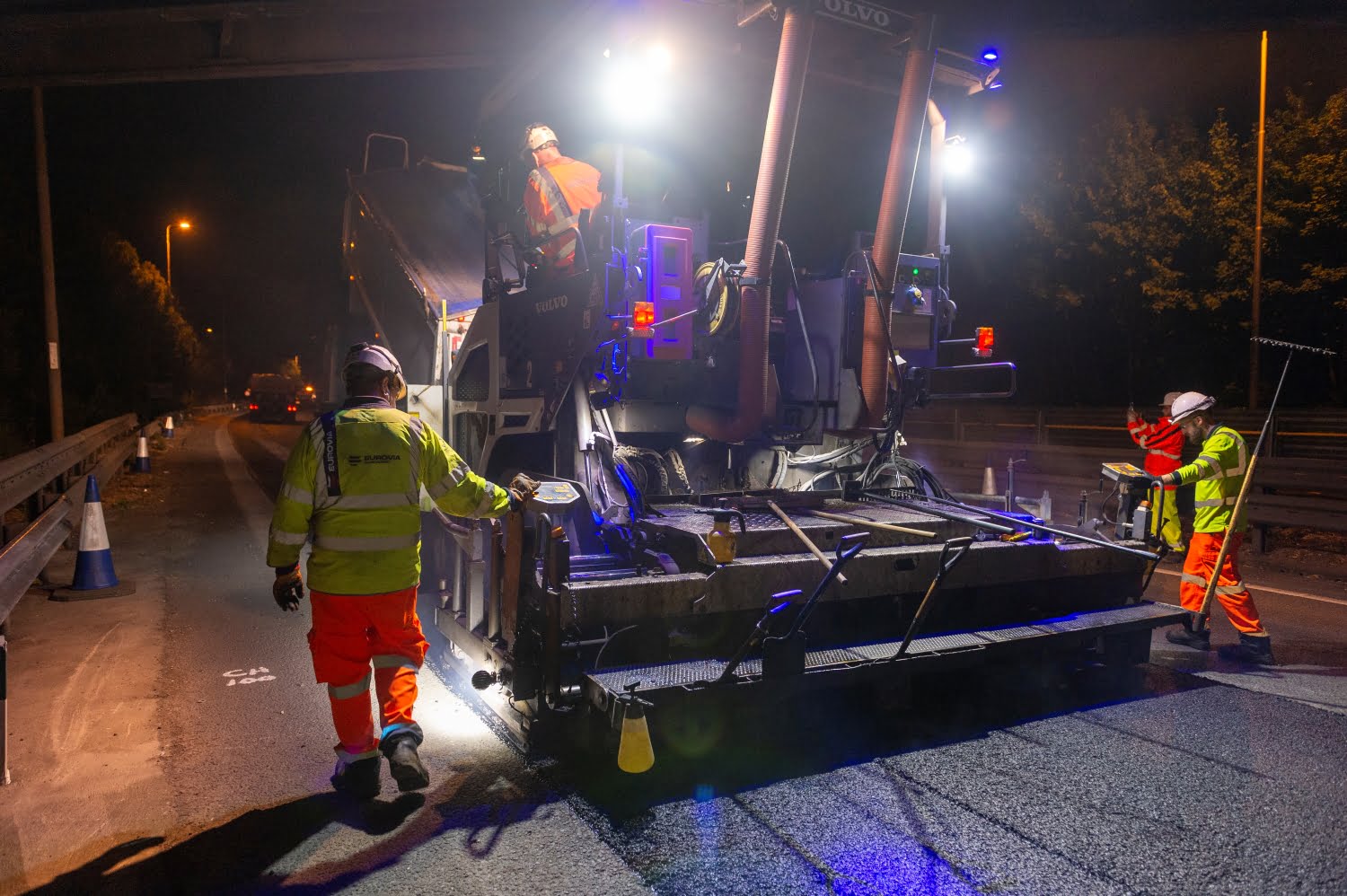National Highways is trialling a graphene-enhanced asphalt which could extend the lifespan of pavement on the strategic road network while reducing their carbon footprint.
The surface incorporates a proprietary graphene-enhanced polymeric additive, called Gipave. Graphene is the strongest compound discovered (100-300 times stronger than steel) and acts as a reinforcement to the bitumen film surrounding aggregates in asphalt.
The surface was laid on the A12 northbound between Hatfield Peverel and Witham in Essex in mid-August. It contained 40% reclaimed asphalt – the highest level ever used in the UK for asphalt with graphene-enhanced polymeric modifier. Previous studies have shown Gipave has improved stiffness and resistance to rutting compared to conventional asphalt while improving fatigue endurance. The performance of the material on the A12 will be monitored over several years.
This trial is part of a National Highways research project under SPaTS 2 which is testing several emerging, low carbon asphalt products. The trial is adopting both hot and warm mix technologies for comparison studies. It is being conducted with the help of industry partners Eurovia, Jean Lefebvre (UK), AtkinsRéalis, Iterchimica and Directa Plus.
This is the first time Gipave has been applied on the strategic road network and follows ongoing trials in Oxfordshire, Kent, Staffordshire and Essex by councils. This technology has been adopted internationally including at the new San Giorgio bridge in Genova, Treviso Airport runway, Edinburgh and Rome Fiumicino Airport taxiways, the main motorways in northern Italy – the A4 Turin-Milan and the A4 Brescia-Padua – and the F1 Imola circuit in Italy.
Gipave has been developed by Iterchimica which Eurovia UK produced and installed on the A12 surfacing with support from specialist Jean Lefebvre UK for the mix design. AtkinsRéalis will closely analyse the performance of the one-kilometre trial section including its carbon footprint and whole-life benefits, measuring it against a control section of standard polymer-modified bitumen asphalt.
The trial is being coordinated by an AtkinsRéalis-Jacobs joint venture as part of a National Highways research project which University of Nottingham and Jean Lefebvre UK will support with the lab testing.
Umesh Parajuli, Project Sponsor and Senior Pavement Advisor at National Highways said: “We are constantly exploring new ways to improve our road network with a focus on three imperatives: safety, the customer and delivery. It’s encouraging to move innovative road materials from the lab to the real world, as they promise more durability and efficiency, while maintaining road user safety and lowering carbon emissions. This trial of graphene-enhanced asphalt supports our 2040 net zero target for construction and maintenance and could provide significant whole-life benefits, improving the service life of both local and national networks.”
Michael Wright, Technical Director, Transportation UK, at AtkinsRéalis, said: “The trial of graphene-enhanced asphalt marks a step towards more advanced road construction in the UK and builds on our work with National Highways to trial emerging technologies. We will closely analyse the performance of this innovative product, which could lead to significant improvements in road durability and reduce environmental impact through a new, sustainable circular economy.”
Lorenzo Sangalli, Gipave Product Manager at Iterchimica, said: “We are proud to have the opportunity to use our innovative technology once again in the UK, alongside prominent players such as National Highways, Eurovia & Jean Lefebvre (UK), AtkinsRéalis and Directa Plus. The combination of Gipave with high percentages of recycled asphalt has already demonstrated higher performances in similar contexts, extending the service life of asphalt pavements and resulting in greater benefits in terms of sustainability and circular economy.”
Jonathan Core, Technical Director at Jean Lefebvre (UK) said: “Eurovia are committed to limiting our carbon impact by moving towards a circular economy. This includes the implementation of professional recycling processes, implementing efficient techniques, adopting effective behaviour patterns, as well as looking at enhancing the durability of our products through the Research and Development of innovative materials and processes, such as Gipave. Collaboration and close coordination with industry experts, such as Iterchimica and AtkinsRealis is an essential component in us achieving our objectives.”
Giulio Cesareo, Directa Plus CEO, said: “The continued use of Gipave demonstrates the growing recognition of its ability to improve road durability and sustainability, aligning with our mission to deliver cutting-edge, eco-friendly solutions to the infrastructure sector. We thank all the partners involved in this project for their commitment and collaboration.”
(Picture – AtkinsRealis)
























